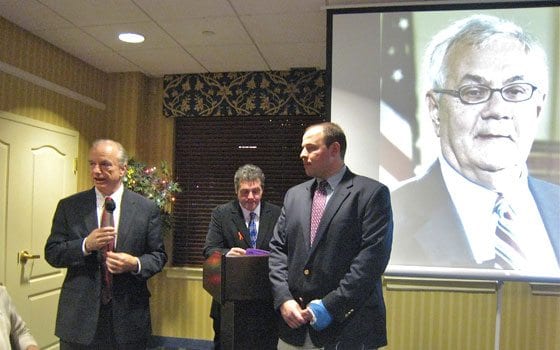
Vows to keep fighting even in new conservative Congress
The Massachusetts Alliance of HUD Tenants (MAHT) gathered earlier this month to honor Congressman Barney Frank, citing the longtime Massachusetts legislator’s “brilliant leadership and unwavering commitment” in the area of affordable housing.
The guest of honor had planned to attend the Dec. 16 event, which was also the group’s holiday party, but instead was on the House floor in Washington, D.C. preparing for the late-night vote on the compromise tax cut bill.
With the aid of a cell phone in Washington and a loudspeaker in Boston, Frank was able to address the gathering of about 70 people assembled in the community room of the Susan S. Bailis assisted living facility. He had warm words for the national and state HUD tenants groups — and fiery words for the Republicans who prioritize wars and tax cuts over providing and preserving affordable housing.
“Let me tell you, the biggest single disappointment on election night last month [as Republicans gained a majority of seats in the House of Representatives],” he said, “was that the housing agenda we’ve been working on so long would be put off again.”
Frank, who has been chairman of the House Financial Services Committee since 2007 but will lose that role in January, said he has always supported a range of housing options, including renting and homeownership. Two years ago, with a Democratic president and a Democratic Congress in place, he said, he had high hopes for moving forward on legislation to support affordable housing.
He expressed dismay that the window is now closing.
“I wish this wasn’t partisan — and I wish I could eat more and not gain weight!” he joked bitterly. “But if we don’t have the democratic majority, we don’t get anywhere.”
Last March, Frank filed the Housing Preservation and Tenant Protection Act of 2010, a bill that had been in the works for several years. It didn’t pass. Now, with a new, more Republican legislature starting up in January, the bill is essentially dead.
Frank tied the lack of funding for affordable housing directly to overspending on the military. He angrily decried the “unfortunate, tragic war in Iraq” and called for “bringing the money back home” from Iraq, Afghanistan and Europe.
“We cannot achieve what we want for the quality of life in the United States for people with limited income, people who have not gotten a fair shake from the economy, living in places where jobs are flat,” he insisted, his voice rising to a shout, “until we change the policy of America’s worldwide role of being everybody’s military policemen, whether they need it or not.”
He urged MAHT and all groups working on behalf of people of limited means to include concern about military spending as part of their message.
MAHT and its national umbrella group, the National Alliance of HUD Tenants (NAHT) comprise tenants who live in privately-owned multi-family buildings made affordable by U.S. Dept. of Housing and Urban Development (HUD) subsidies. For decades, they have organized tenants to have more power over their living situations. As many of the HUD mortgages originating in the 1970s reach maturity, the groups are fighting to protect subsidized apartments from owners who want to convert to market-rate rents.
Massachusetts alone has lost more than 6,555 federally subsidized housing units since 1996 as HUD subsidies have expired, and another 19,000 units statewide could be lost through 2012, according to MAHT Executive Director Michael Kane, who is also executive director of NAHT.
When it became clear Frank’s housing bill was unlikely to pass this year, NAHT proposed a $25 million amendment to the omnibus appropriations bill for fiscal year 2011. The amendment includes a provision to protect tenants from displacement after HUD contract expiration by making more tenants eligible for the “enhanced vouchers” that help pay the increased rent.
But the fate of even that amendment was unclear. The appropriations bill was held up last week, under fire by Republicans for its “earmark” spending proposals by legislators favoring projects in their home states. Both Frank and MAHT members said they believe achieving tenant-friendly housing legislation will be substantially harder in the new, more conservative Congress to be sworn in on Jan. 3.
The proposed amendment has immediate urgency for MAHT. At Georgetowne Homes in West Roxbury, Kane said, 286 families could see their rents increase by hundreds of dollars as early as April 2011 if the tenants do not become eligible for enhanced vouchers.
Despite gloom over the new Congress and uncertainty over the appropriations bill, the tone of the holiday party remained positive. Kane announced that Sen. Scott Brown had recently sent a requested letter of support for the housing amendment to other senators, and said MAHT is working to arrange a meeting with Brown at Georgetowne Homes.
Kane and others told stories of Frank’s support over the years and the victories obtained with his help, including the Boston Housing Partnership II launched in the late 1980s that saved 925 affordable units in Boston.
Nonetheless, Frank closed his cell phone call on a rueful note.
“I’m very sorry I can’t be there with you — folks with whom I share the greatest and deepest values,” he told the group.
“I am regretful that we’re not going to be able to make the progress I had hoped,” he added, “but we’re going to keep fighting and keep working for people to have a decent home whether it’s something they own, whether it’s something they rent, whether it’s public, or what. We’re not giving up.”


![Banner [Virtual] Art Gallery](https://baystatebanner.com/wp-content/uploads/2024/04/Cagen-Luse_Men-at-store-e1713991226112-150x150.jpg)



